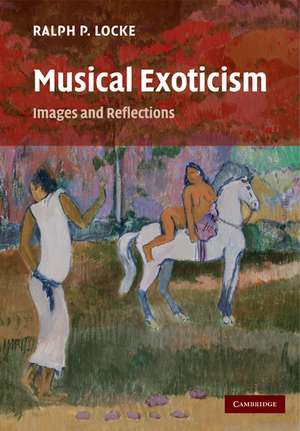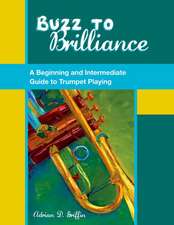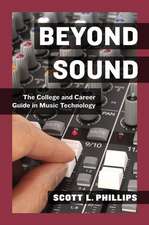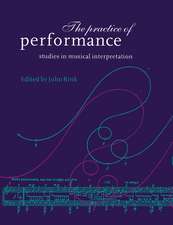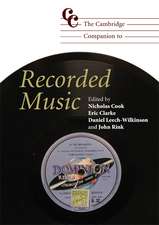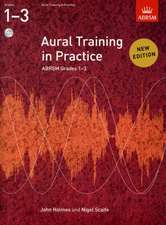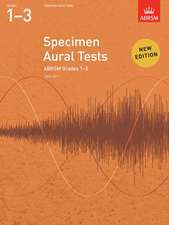Musical Exoticism: Images and Reflections
Autor Ralph P. Lockeen Limba Engleză Paperback – 23 noi 2011
| Toate formatele și edițiile | Preț | Express |
|---|---|---|
| Paperback (1) | 404.68 lei 6-8 săpt. | |
| Cambridge University Press – 23 noi 2011 | 404.68 lei 6-8 săpt. | |
| Hardback (1) | 523.24 lei 6-8 săpt. | |
| Cambridge University Press – apr 2009 | 523.24 lei 6-8 săpt. |
Preț: 404.68 lei
Nou
Puncte Express: 607
Preț estimativ în valută:
77.43€ • 80.85$ • 63.94£
77.43€ • 80.85$ • 63.94£
Carte tipărită la comandă
Livrare economică 15-29 aprilie
Preluare comenzi: 021 569.72.76
Specificații
ISBN-13: 9780521349550
ISBN-10: 0521349559
Pagini: 440
Ilustrații: black & white illustrations, figures, printed music items
Dimensiuni: 170 x 244 x 23 mm
Greutate: 0.69 kg
Editura: Cambridge University Press
Colecția Cambridge University Press
Locul publicării:Cambridge, United Kingdom
ISBN-10: 0521349559
Pagini: 440
Ilustrații: black & white illustrations, figures, printed music items
Dimensiuni: 170 x 244 x 23 mm
Greutate: 0.69 kg
Editura: Cambridge University Press
Colecția Cambridge University Press
Locul publicării:Cambridge, United Kingdom
Cuprins
Part I: 1. Music, the world, and the critic; 2. Questions of value; 3. Exoticism with and without exotic style; 4. Who is 'Us'?: the national and/as the exotic, and the treatment of stereotypes; Part II: 5. Baroque portrayals of despots: ancient Babylon, Incan Peru; 6. A world of exotic styles, 1750–1880; 7. Exotic operas and two Spanish 'Gypsies'; 8. Imperialism and 'the exotic Orient'; 9. Exoticism in a modernist age (ca. 1890–1960); 10. Exoticism in a global age (ca. 1960 to today); 11. Epilogue: exotic works of the past, today.
Recenzii
Review of the hardback: 'Depictions of Turkish pashas, Spanish gypsies, and of amusing or threatening foreigners are very familiar to musicians and audiences, yet Ralph P. Locke is the first critic to confront this enormous repertoire as a major phenomenon in western music. The range - from baroque opera to jazz - is vast, and the ethical and political issues are more relevant today than ever. Locke's penetrating study explores the manifold implications of evoking exotic cultures in music, and offers insights that force us to rethink many of our most firmly held assumptions.' Hugh Macdonald, Avis H. Blewett Professor of Music, Washington University, St Louis
Review of the hardback: 'In this ambitious and challenging monograph, Ralph Locke proves himself to be an extremely expert guide to that musical Elsewhere that we all know but little understand, whether it be the multiple locations of Rameau's Les Indes galantes, the Turkey of Mozart's Die Entführung aus dem Serail, the Sri Lanka of Bizet's Les pêcheurs de perles, the neighbourhood Otherness of Bernstein's West Side Story, or the journey from Venice to China undertaken by Tan Dun's Marco Polo.' David Nicholls, Professor of Music, University of Southampton
Review of the hardback: 'In this book, Ralph Locke offers a comprehensive and probing examination of musical exoticism in diverse musical repertoires that range from Rameau to Algerian Rap. He effectively bridges the gap between cultural and musical analyses of exoticism by grounding stylistic traits and paradigms to specific ideologies (colonialism, imperialism, Orientalism, and globalization) and cultural contexts. In demonstrating how western audiences' understanding of exoticism is mediated by cultural preconceptions and 'situated' knowledge, Locke carefully negotiates the multiple subject positions and social forces that have shaped its discursive practice.' Yayoi Uno Everett, Associate Professor, Music Department, Emory University
Review of the hardback: 'Locke's impressive achievement in Musical Exoticism is at least threefold: to have offered a synthetic account of its area of investigation, drawing judiciously upon a voluminous bibliography and over two decades of his own extensive research on musical exoticism, nineteenth-century art music and opera, and music's relationship to politics; to have offered a new research paradigm as a much-needed corrective to scholars of exoticism and orientalism in music, who have hitherto focused primarily on the 'borrowing' or appropriation of musical materials (scales, modes, tunes, styles, etc.), too often at the expense of issues of representation and interpretation; and to have outlined a compelling periodization of exoticism's shifting role within the dual histories of Western art music and Western imperialism. But, I hope that the book is also remembered for its simultaneously generous and critical - and, one might therefore reasonably suggest, Saidian - impulse to examine and assess artworks in a patently non-reductive manner. Indeed, some of the best material in the book can be found in its rich, authoritative treatments of specific compositions, creators, keywords, and topoi that span three centuries of musical production. Equally important are the book's lucid prose and accessibility to general readers, which should garner it a wide audience.' Sumanth Gopinath, Assistant Professor of Music Theory, University of Minnesota
Review of the hardback: 'Insightful and original. … [A] subtle and powerful account of musical understanding. … Musical Exoticism is not just a fine instance of contemporary musicology but also a timely intervention in debates about the ethical and didactic role of the arts in society.' Conor Farrington, The Times Literary Supplement
Review of the hardback: 'Weaves together musical analysis with thoughtful reflections … [The] anecdotes provide fresh insight to time-honored classics for readers of all backgrounds.' Kristy Riggs, Current Musicology
Review of the hardback: 'Locke's superb book will undoubtedly help amplify the horizons of scholarship in the ever-expanding area of musical exoticism, by exploring the pitfalls, proposing alternative interpretations, broadening the repertory under discussion and, ultimately, by heightening our understanding of our position as listeners and consumers.' Musicology
Review of the hardback: '[Locke's] approach is warm, enthusiastic and instructive on those musical details introduced in order to 'link a work to some fascinating, attractive or fearsome place' … Interesting points are made about familiar pieces, such as Carmen's versatility in Spanish, Cuban and flamenco music.' Peter Williams, Musical Times
Review of the hardback: 'A masterful study. … Written in such an accessible way that non-specialist readers can easily relate to it, it will also be of great relevance to scholars working in related fields, such as literary criticism, theatre studies, cultural history and even social anthropology. … A shining example of how musicologists can situate themselves in the context of global history. … I recommend it unhesitatingly to all readers with an interest in how Western music situates itself in the world, and how the West attempts to represent the rest of the world through sound, text and image. Musical Exoticism should be the standard textbook on the subject for undergraduate music students, and a ready reference for anyone interested in the topic.' David R. M. Irving, Early Music
Review of the hardback: 'A comprehensive survey of three centuries of [musical] exoticism framed by a highly flexible yet incisive theoretical approach … The very readable text is clearly aimed at a diverse group of scholars, musicians, and concertgoers. Theoretical terms (both musical and cultural) are helpfully explained and even the most complicated ideas are communicated in clear and jargon-free language.' Shay Loya, Music Library Association Notes
'A major … contribution to musicological scholarship. Locke is not bound by terminologically reified concepts, but constantly shapes and evolves his definitions to respond symbiotically to his musical material. As such the conventional philosophical binarisms of exoticism are treated critically: then/now; self/other; near/far; fact/fiction - these are systematically dismantled and reassembled in [the] later, more music-orientated chapters of the book … The basic profundity of Locke's book: it asks questions about questions.' Bennett Zon, Journal of the Society for Musicology in Ireland
'An insightful compendium for the well-versed scholar in the field as well as the keen amateur … A benchmark in the field of musicology … An indispensable companion.' Nina Stoffers, Revista de etnografie si folclor (Journal of Ethnography and Folklore)
'A splendid history … The musicological journey of this book is as fascinating as the subject itself … A compulsory reference for any academic curriculum of both musicology and the history of cultural ideas … Important for a very wide range of musicologists and ethnomusicologists, as well as of people doing cultural studies.' Marin Marian-Balasa, Revista de etnografie si folclor (Journal of Ethnography and Folklore)
'… Ralph Locke's new book provides not just academic specialists, but students and possibly general readers with a mature and fair-minded summary of musical exoticism … This might serve well as a textbook for an undergraduate module, or as initial reading for a (post)graduate seminar. For those coming at the topic for the first time, it represents a well designed and carefully balanced introduction. Everyone benefits from Locke's use of plain, readable language.' Matthew Head, Nineteenth-Century Music Review
Review of the hardback: 'In this ambitious and challenging monograph, Ralph Locke proves himself to be an extremely expert guide to that musical Elsewhere that we all know but little understand, whether it be the multiple locations of Rameau's Les Indes galantes, the Turkey of Mozart's Die Entführung aus dem Serail, the Sri Lanka of Bizet's Les pêcheurs de perles, the neighbourhood Otherness of Bernstein's West Side Story, or the journey from Venice to China undertaken by Tan Dun's Marco Polo.' David Nicholls, Professor of Music, University of Southampton
Review of the hardback: 'In this book, Ralph Locke offers a comprehensive and probing examination of musical exoticism in diverse musical repertoires that range from Rameau to Algerian Rap. He effectively bridges the gap between cultural and musical analyses of exoticism by grounding stylistic traits and paradigms to specific ideologies (colonialism, imperialism, Orientalism, and globalization) and cultural contexts. In demonstrating how western audiences' understanding of exoticism is mediated by cultural preconceptions and 'situated' knowledge, Locke carefully negotiates the multiple subject positions and social forces that have shaped its discursive practice.' Yayoi Uno Everett, Associate Professor, Music Department, Emory University
Review of the hardback: 'Locke's impressive achievement in Musical Exoticism is at least threefold: to have offered a synthetic account of its area of investigation, drawing judiciously upon a voluminous bibliography and over two decades of his own extensive research on musical exoticism, nineteenth-century art music and opera, and music's relationship to politics; to have offered a new research paradigm as a much-needed corrective to scholars of exoticism and orientalism in music, who have hitherto focused primarily on the 'borrowing' or appropriation of musical materials (scales, modes, tunes, styles, etc.), too often at the expense of issues of representation and interpretation; and to have outlined a compelling periodization of exoticism's shifting role within the dual histories of Western art music and Western imperialism. But, I hope that the book is also remembered for its simultaneously generous and critical - and, one might therefore reasonably suggest, Saidian - impulse to examine and assess artworks in a patently non-reductive manner. Indeed, some of the best material in the book can be found in its rich, authoritative treatments of specific compositions, creators, keywords, and topoi that span three centuries of musical production. Equally important are the book's lucid prose and accessibility to general readers, which should garner it a wide audience.' Sumanth Gopinath, Assistant Professor of Music Theory, University of Minnesota
Review of the hardback: 'Insightful and original. … [A] subtle and powerful account of musical understanding. … Musical Exoticism is not just a fine instance of contemporary musicology but also a timely intervention in debates about the ethical and didactic role of the arts in society.' Conor Farrington, The Times Literary Supplement
Review of the hardback: 'Weaves together musical analysis with thoughtful reflections … [The] anecdotes provide fresh insight to time-honored classics for readers of all backgrounds.' Kristy Riggs, Current Musicology
Review of the hardback: 'Locke's superb book will undoubtedly help amplify the horizons of scholarship in the ever-expanding area of musical exoticism, by exploring the pitfalls, proposing alternative interpretations, broadening the repertory under discussion and, ultimately, by heightening our understanding of our position as listeners and consumers.' Musicology
Review of the hardback: '[Locke's] approach is warm, enthusiastic and instructive on those musical details introduced in order to 'link a work to some fascinating, attractive or fearsome place' … Interesting points are made about familiar pieces, such as Carmen's versatility in Spanish, Cuban and flamenco music.' Peter Williams, Musical Times
Review of the hardback: 'A masterful study. … Written in such an accessible way that non-specialist readers can easily relate to it, it will also be of great relevance to scholars working in related fields, such as literary criticism, theatre studies, cultural history and even social anthropology. … A shining example of how musicologists can situate themselves in the context of global history. … I recommend it unhesitatingly to all readers with an interest in how Western music situates itself in the world, and how the West attempts to represent the rest of the world through sound, text and image. Musical Exoticism should be the standard textbook on the subject for undergraduate music students, and a ready reference for anyone interested in the topic.' David R. M. Irving, Early Music
Review of the hardback: 'A comprehensive survey of three centuries of [musical] exoticism framed by a highly flexible yet incisive theoretical approach … The very readable text is clearly aimed at a diverse group of scholars, musicians, and concertgoers. Theoretical terms (both musical and cultural) are helpfully explained and even the most complicated ideas are communicated in clear and jargon-free language.' Shay Loya, Music Library Association Notes
'A major … contribution to musicological scholarship. Locke is not bound by terminologically reified concepts, but constantly shapes and evolves his definitions to respond symbiotically to his musical material. As such the conventional philosophical binarisms of exoticism are treated critically: then/now; self/other; near/far; fact/fiction - these are systematically dismantled and reassembled in [the] later, more music-orientated chapters of the book … The basic profundity of Locke's book: it asks questions about questions.' Bennett Zon, Journal of the Society for Musicology in Ireland
'An insightful compendium for the well-versed scholar in the field as well as the keen amateur … A benchmark in the field of musicology … An indispensable companion.' Nina Stoffers, Revista de etnografie si folclor (Journal of Ethnography and Folklore)
'A splendid history … The musicological journey of this book is as fascinating as the subject itself … A compulsory reference for any academic curriculum of both musicology and the history of cultural ideas … Important for a very wide range of musicologists and ethnomusicologists, as well as of people doing cultural studies.' Marin Marian-Balasa, Revista de etnografie si folclor (Journal of Ethnography and Folklore)
'… Ralph Locke's new book provides not just academic specialists, but students and possibly general readers with a mature and fair-minded summary of musical exoticism … This might serve well as a textbook for an undergraduate module, or as initial reading for a (post)graduate seminar. For those coming at the topic for the first time, it represents a well designed and carefully balanced introduction. Everyone benefits from Locke's use of plain, readable language.' Matthew Head, Nineteenth-Century Music Review
Descriere
This book surveys the vast and varied repertoire of Western musical works that portray exotic locales, exploring their persuasive and disturbing effects.
